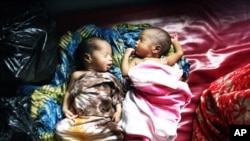The medical aid group Doctors Without Borders, also known by the French acronym MSF, released a report entitled, “Hear My Voice.” It draws on the testimonies of more than 800 Somali patients of the MSF medical facilities in Somali and Ethiopian refugee camps. The group says the testimonies reveal what life is like now for Somalis, most of whom describe lives of insecurity, violence and a lack of food and shelter.
Gautam Chatterjee, MSF’s head of mission for Somalia, described how Somalis are being affected by food insecurity, displacement, sexual violence, and access to healthcare.
“People have been dependent on food aid for a long time,” said Chatterjee. “The ongoing violence and the displacement have prevented people from planting. We also see that food aid has not been able to reach some areas because of the lack of access to humanitarian agencies. So all of these put together have put the food security situation in a crisis.”
He added that people have moved to places where food aid is being distributed such as Mogadishu and refugee camps in Ethiopia and Kenya. He said people are continuing to run away from violence and from illness.
“We see that there have been reports of sexual violence against women and we see that access to healthcare is extremely poor and people have traveled long distances to access healthcare where it is available,” explained Chatterjee.
Chatterjee said the compilation of testimonies from Somali patients is based on medical staff interviews where patients are asked such questions as; “Why have you walked 80 kilometers to access our hospital?” The patients then tell them how they arrived and what they are doing to cope with their dire circumstances in trying to survive in a dire situation.
Gautam Chatterjee, MSF’s head of mission for Somalia, described how Somalis are being affected by food insecurity, displacement, sexual violence, and access to healthcare.
“People have been dependent on food aid for a long time,” said Chatterjee. “The ongoing violence and the displacement have prevented people from planting. We also see that food aid has not been able to reach some areas because of the lack of access to humanitarian agencies. So all of these put together have put the food security situation in a crisis.”
He added that people have moved to places where food aid is being distributed such as Mogadishu and refugee camps in Ethiopia and Kenya. He said people are continuing to run away from violence and from illness.
“We see that there have been reports of sexual violence against women and we see that access to healthcare is extremely poor and people have traveled long distances to access healthcare where it is available,” explained Chatterjee.
Chatterjee said the compilation of testimonies from Somali patients is based on medical staff interviews where patients are asked such questions as; “Why have you walked 80 kilometers to access our hospital?” The patients then tell them how they arrived and what they are doing to cope with their dire circumstances in trying to survive in a dire situation.









